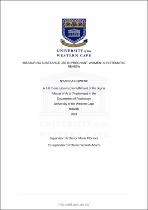| dc.description.abstract | Introduction: Substance use during pregnancy is a pressing global public health and clinical concern. Tools to measure substance use during pregnancy can be used to ascertain harmful use of substances and related complications for the unborn child. Past studies have identified poor rates of detection of prenatal substance use. Consequently, prenatal substance use screening is a common feature to target prevention, treatment, and best practice guidelines. However, there is little information to support the selection of appropriate substance use screening tools for use with pregnant women. Study aim: The study aimed to systematically review the existing empirical research on screening methods (biological or self-report) used to detect substance use in pregnant women. The objectives of the study were: to identify types of screening methods used in empirical research studies to identify substance use in pregnant women, to determine the utility of these screening methods; and to determine the limitations of these screening methods. | en_US |

